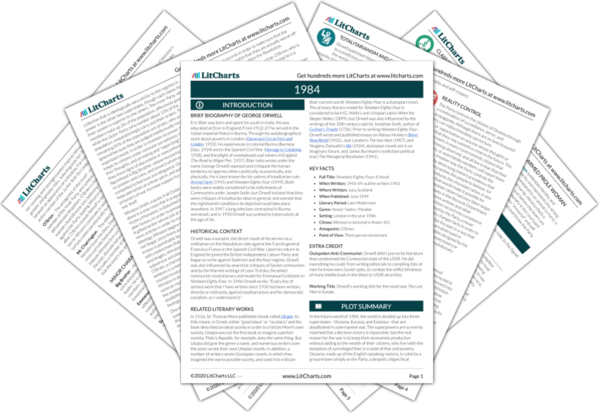Summary
Analysis
Winston and Julia go to O'Brien's luxurious apartment, where O'Brien's servant, Martin, admits them into a room where O'Brien is dictating a message in Newspeak. To Winston's amazement, O'Brien turns off the telescreen, a privilege allowed to Inner Party members.
O'Brien can turn off the surveillance of the Party. He has a degree of self-control over his own life and the Party's access to it.
Themes
Winston confesses that he and Julia are enemies of the Party and adulterers. O'Brien serves Julia and Winston wine, which neither of them have ever tasted. Winston proposes a toast to the past.
Winston takes the decisive step of trusting someone other than Julia, of stating his antagonism to the Party, and then demonstrating that antagonism by toasting to the past.
Themes
O'Brien tells Winston that the Brotherhood is real and that Emmanuel Goldstein is alive. He then asks Winston a series of questions in order to test his commitment to working against the Party. Winston answers yes to all of them except the last—he is prepared to do anything but separate from Julia.
Winston affirms to O'Brien both his hatred of the Party and his love for Julia. Winston knows he's taking a risk in exposing himself this way, but wants, above all, to fight against the party.
Themes
O'Brien promises to send Winston a book that teaches the true nature of their society and how it can be destroyed. After reading it, O'Brien promises, Winston and Julia will be full members of the Brotherhood. He explains that members of the Brotherhood work alone, for safety reasons, but their orders will come from him. They drink to the past, and Julia leaves.
O'Brien confirms Winston's greatest hopes about the Brotherhood: that it is real, that it can reveal the workings of the Party, and that it knows how to defeat the Party.
Themes
Get the entire 1984 LitChart as a printable PDF.

As he is leaving, Winston asks O'Brien if they will meet again "in the place where there is no darkness." O'Brien nods without surprise. Winston then asks O'Brien if he knows the ending of the rhyme about the London churches. O'Brien completes the rhyme. As he departs, Winston realizes that O'Brien, too, leads a double life, working for the Party's interests even as he seeks to undermine them.
O'Brien's knowledge of the old nursery rhyme further indicates to Winston that O'Brien stands against the Party. How could he possibly he know enough about history and truly belong to the Party? The "place where there is no darkness" could be a positive or negative: on the one hand, darkness is usually associated with evil or terror or other bad things. On the other hand, darkness provides privacy, and a place with no darkness is similar, then, to a place under constant surveillance.
Themes












